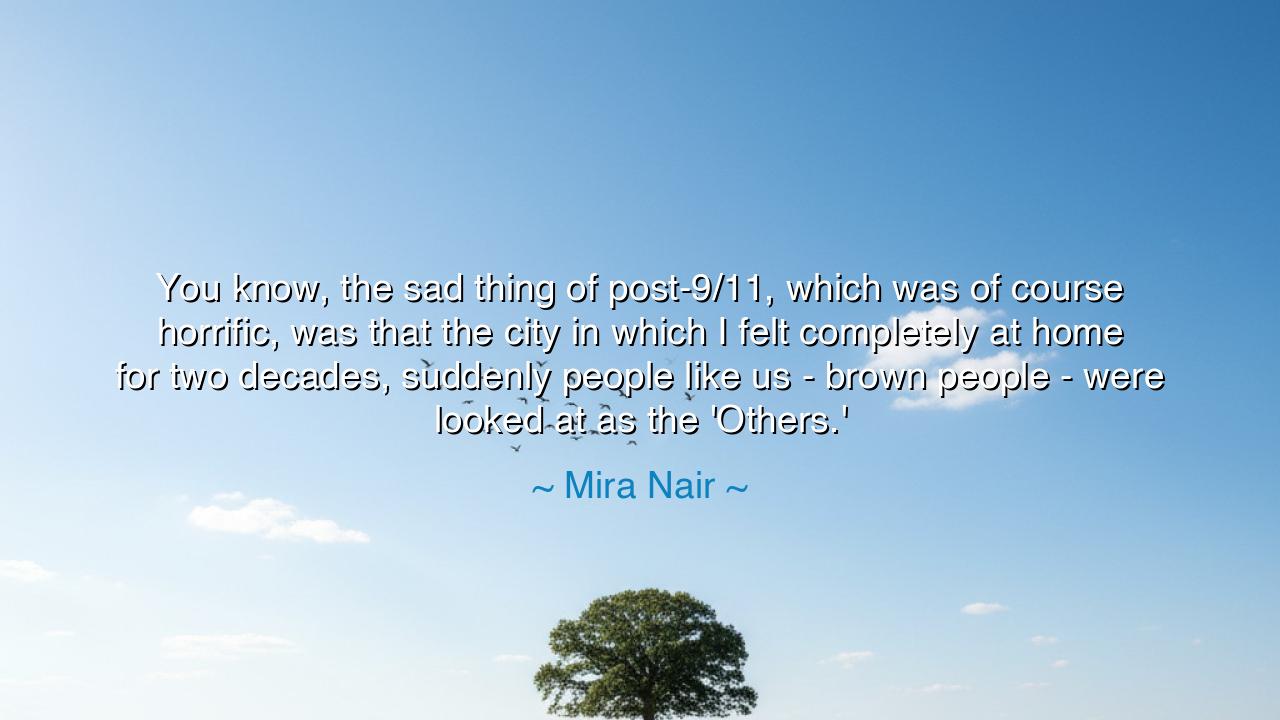
You know, the sad thing of post-9/11, which was of course
You know, the sad thing of post-9/11, which was of course horrific, was that the city in which I felt completely at home for two decades, suddenly people like us - brown people - were looked at as the 'Others.'






Mira Nair, the visionary filmmaker and storyteller of many worlds, once spoke these sorrowful and piercing words: “You know, the sad thing of post-9/11, which was of course horrific, was that the city in which I felt completely at home for two decades, suddenly people like us — brown people — were looked at as the ‘Others.’” In this reflection lies the pain of belonging lost, of identity fractured, and of love betrayed by fear. Her lament is not merely personal; it is the cry of millions whose faces, once unnoticed in their harmony with the crowd, became symbols of suspicion after tragedy. For in the shadow of fear, humanity often forgets itself.
In the ancient world, the wise warned of this peril — that when nations are wounded, they seek comfort not in truth, but in division. The Athenians, when struck by plague and war, turned upon foreigners and philosophers alike, blaming them for the gods’ wrath. So too, in the modern age, after the towers fell, a cloud of fear descended upon America. Mira Nair, who had made that land her home, felt the weight of this transformation. What had been a city of dreams became a city of wary glances. Where once there was welcome, there was distance. The invisible wall of “Otherness” rose again, ancient and cruel, between neighbor and neighbor.
The “sad thing,” as she calls it, is not merely the fear that follows terror — that fear is human and forgivable — but the loss of compassion that it breeds. In a moment, identity became suspicion, and color became accusation. The irony is sharp and tragic: those who fled oppression, who came seeking liberty and belonging, suddenly found themselves exiled within the very land they had embraced. It was as if the promise of equality had fractured under the weight of its own fear. Nair’s sorrow reminds us that the true wound of 9/11 was not only in buildings destroyed, but in trust undone.
We can recall similar moments from the scrolls of history. During the plague years of medieval Europe, entire communities of Jews were hunted and killed, accused of poisoning wells and bringing disease. The frightened sought safety by scapegoating the innocent. In America, after the bombing of Pearl Harbor, Japanese-Americans — loyal citizens, born of the same soil — were rounded into camps. Again and again, humanity repeats this pattern: when darkness falls, we look for someone to blame, and in doing so, we become blind to ourselves. Mira Nair’s experience is not new, but her words renew the warning: that fear can unmake even the most enlightened society.
Yet within her grief there is also dignity — the strength of one who refuses to be defined by hatred. Nair does not speak with bitterness; she speaks with sorrow and clarity. For to be labeled the “Other” is not merely to be misjudged — it is to be denied one’s shared humanity. And still, she endures, creating films that bridge worlds, weaving stories that remind us of our interconnectedness. Her art becomes her answer: to counter division with empathy, ignorance with beauty, suspicion with understanding. The artist, she teaches us, must become the healer of the world’s fractures.
The deeper truth of her words is this: every nation, every community, every heart will be tested by fear. And in those moments, the measure of our civilization will not be in our power, but in our compassion. Do we build walls or bridges? Do we recoil from difference, or do we reach toward it with open hands? To see another as “Other” is to deny the divine reflection that lives in all souls. Only when we learn to look at one another and see ourselves — brown, black, white, or any hue between — will peace truly begin.
So, children of the future, take this teaching to heart. Do not let fear make strangers of your neighbors. When tragedy strikes, let empathy rise faster than anger. When voices whisper division, answer with understanding. For one day, you too may find yourself on the other side of the gaze — and it is only through compassion that the circle of belonging is ever restored. Mira Nair’s sorrow, born of exile within the familiar, must not be forgotten. Let it become our vow: never again to let pain make us cruel, nor difference make us blind. For the world is one city, and we are all its citizens.






AAdministratorAdministrator
Welcome, honored guests. Please leave a comment, we will respond soon